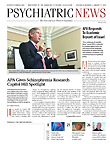Residents and fellows who joined APA since the late 1960s have been referred to by the Association as “members-in-training,” or MITs. But the Board of Trustees changed that long-time designation at its meeting last month. From here on, members who were formerly MITs will be known as resident-fellow members, or RFMs.
The proposal for the change in terminology arose from an action paper passed by the APA Assembly at its November 2013 meeting. The Assembly paper maintained that the member-in-training nomenclature is often unclear to residents and fellows who are not APA members and to physician members of other specialty societies as well as to prospective APA members
To some people, the Assembly proposal stated, the term “could be misunderstood as additional training, aside from residency training, that is required to become a member of APA.” The proposal noted as well that the Accreditation Council for Graduate Medical Education uses “resident” and “fellow” to describe physicians in training programs, as does the AMA, which has a Resident-Fellow Section.
In addition, the National Board of Medical Examiners uses the terms “resident” and “fellow” in materials discussing employment opportunities through the annual Match system, according to the Assembly proposal.
The proposal was developed in large part by Semyon Faynboym, M.D., APA’s resident/fellow representative to the AMA. He explained to Psychiatric News that he was “weary of the term MIT, since I thought it meant further training within APA while in residency. Hence, to avoid misconceptions such as this, and potential loss of membership from the residents and fellows, it was time to make the change from MIT to RFM.”
Commenting on the name change, Erik Vanderlip, M.D., whose position on the APA Board was member-in-training trustee and is now the resident-fellow member trustee, said, “The recent APA designation for its resident and fellow members fits into a broader agenda concerning the integration of psychiatry into the house of medicine. The name change will help to clarify boundaries and classes of membership so that those in residency and fellowship can more easily identify their membership status, locate resources available to them at their level of training, and network with others by fostering a sense of identity formerly muddled in an ambiguous moniker. Personally, I’m thrilled with the change and to continue to serve as the APA resident-fellow member trustee for the remainder of my term.”
Paul O’Leary, M.D., who introduced the proposal in the Assembly along with Brian Hart, M.D., said the rapid endorsement by both the Board and Assembly “symbolized how APA is listening to all of its members and making changes to better serve them.” This sentiment was echoed by the Board’s Resident-Fellow Member Trustee-Elect, Lara Cox, M.D., who said, “It’s so encouraging to see this evidence that we have the power to instigate change and be a part of shaping the future of APA.” ■

